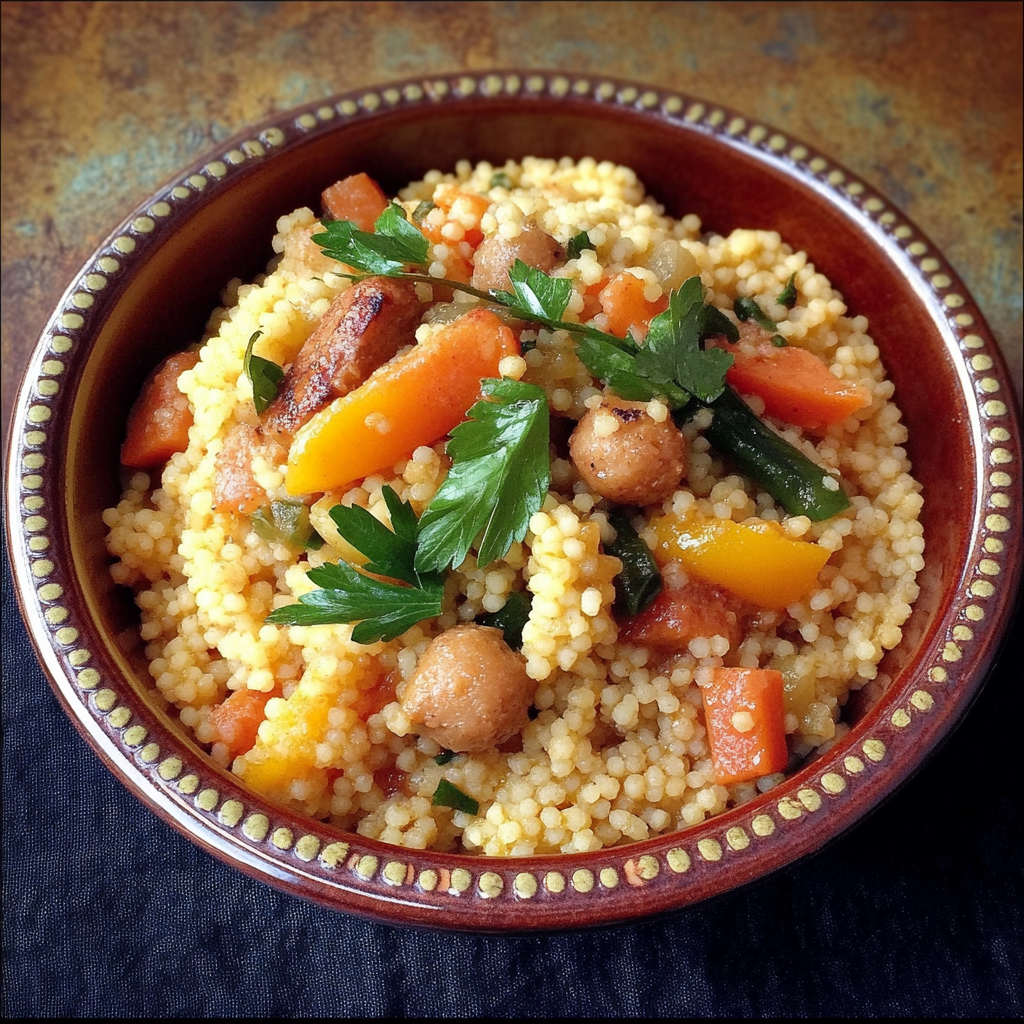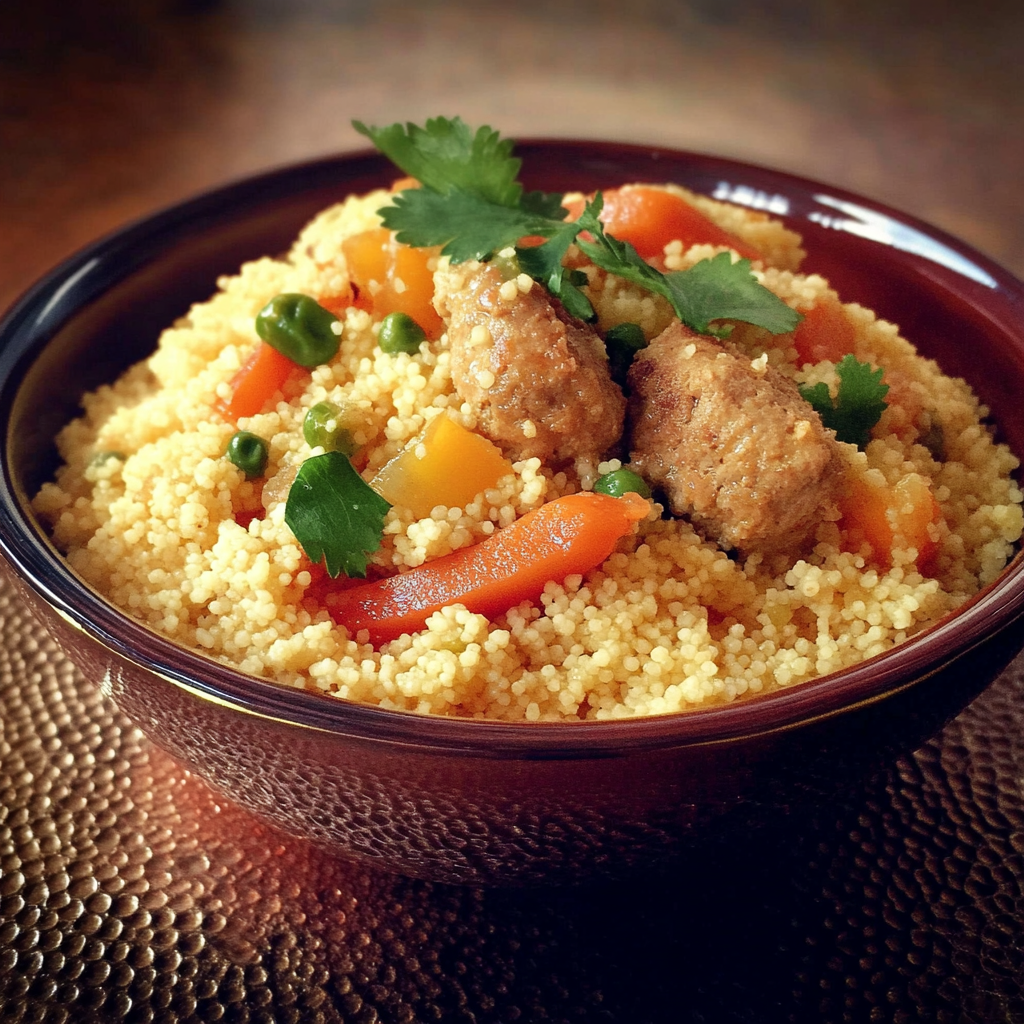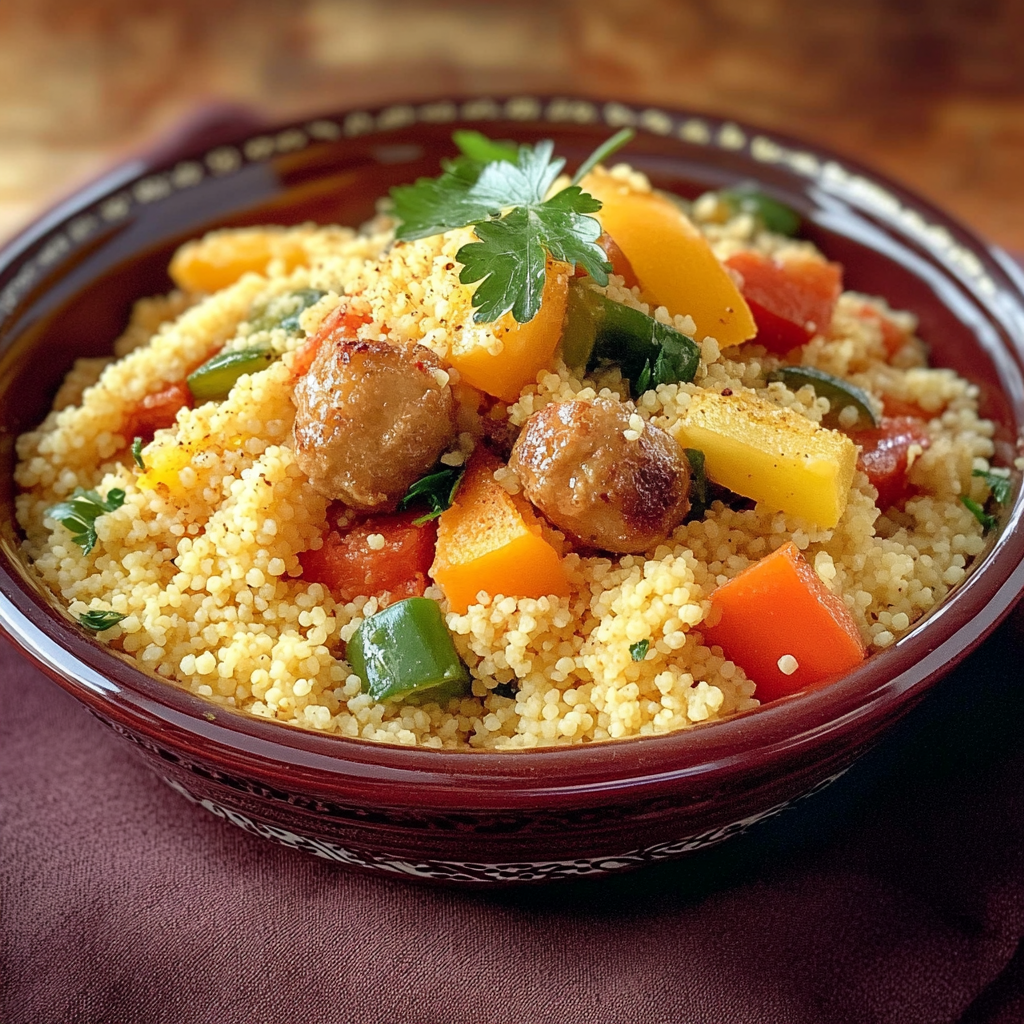Introduction to Couscous 🌾
Couscous has been a culinary staple in North African and Mediterranean kitchens for centuries. It’s light, fluffy, and quick to prepare ⏱, which has made it increasingly popular among health-conscious home cooks around the world.
But with so many grain options out there, people are asking: Is couscous actually healthy? The answer depends on the variety you choose, how it’s prepared, and how it fits into your diet.
But with so many grain options out there, people are asking: Is couscous actually healthy? The answer depends on the variety you choose, how it’s prepared, and how it fits into your diet. Pairing it with flavorful sides like broccoli cheese patties can make it part of a balanced plate.
Make The Best Is couscous healthy In The World
What is Couscous? 🍽
Couscous is made from tiny granules of semolina wheat, rolled with water, and steamed until tender. There are three main varieties:
- Moroccan couscous – the smallest, cooking in just minutes ⏳
- Lebanese couscous – the biggest, taking the longest to cook 🔥
When made with whole wheat, couscous offers extra fiber and nutrients compared to its refined counterpart. It’s also naturally rich in selenium, a mineral essential for immune support and antioxidant protection. You can learn more about the nutritional benefits of selenium from the NIH Office of Dietary Supplements.
For a warm, comforting pairing, try serving couscous alongside creamy garlic baby potatoes for a nutrient-rich dinner.
Nutritional Profile of Couscous 📊
One cup of cooked couscous contains approximately:
- Calories: ~176 🔥
- Carbohydrates: 36g 🍞
- Protein: 6g 💪
- Fat: <1g 🫒
- Fiber: 2g (whole wheat: ~4g) 🌿
- Selenium: 78% of the daily value 🛡
Compared to rice, couscous generally has more protein and fiber. However, it’s not as nutrient-dense as quinoa. Like other grains, it’s best enjoyed in moderation and paired with other nutritious foods. If you want to see how couscous fits into a balanced whole grain diet, the Harvard Nutrition Source guide on whole grains is an excellent resource.
For extra flavor and protein, consider adding a serving of longhorn parmesan crusted chicken to your couscous bowl.
Health Benefits of Couscous 🌟
When part of a balanced diet, whole wheat couscous can offer several key health benefits:
- Rich in Selenium 🛡 – Antioxidant power, immune support, and inflammation control.
- Good Fiber Source 🌿 – Aids digestion, regulates blood sugar, increases satiety.
- Supports Heart Health ❤️ – May help lower cholesterol and maintain healthy blood pressure.
- Weight Management ⚖ – Low in fat and moderate in calories, supports portion control.
- Versatility 🍲 – Works in both savory and sweet recipes.
You could even serve couscous alongside a flavorful main like garlic butter honey BBQ beef tacos for a fusion-style dinner.
Potential Downsides ⚠
While couscous is healthy for many, there are a few drawbacks to consider:
- High Carbohydrate Content 🍞 – Can raise blood sugar if eaten in excess.
- Contains Gluten 🚫 – Not suitable for celiac disease or gluten sensitivity.
- Lower Nutrient Density 📉 – Less vitamins/minerals than some grains.
- Portion Size Matters 🍽 – It’s light and easy to overeat.
Couscous vs Other Grains ⚖
| Feature | Couscous (Whole Wheat) | White Rice | Quinoa |
|---|---|---|---|
| Protein 💪 | 6g | 4g | 8g |
| Fiber 🌿 | 4g | 1g | 5g |
| Gluten-Free ❌/✅ | No | Yes | Yes |
| Cooking Time ⏱ | 5–10 min | 15–20 min | 15–20 min |
Takeaway:
- Couscous vs Rice 🍚 – More fiber and protein than white rice.
- Couscous vs Quinoa 🌱 – Quinoa is higher in protein and gluten-free; couscous cooks faster.
How to Make Couscous Healthier 🥦

While couscous is naturally light, fluffy, and versatile, it’s often served in ways that can make it less healthy — think heavy butter, creamy sauces, or large portion sizes. The good news is you can make couscous far more nutritious by being strategic with ingredients, cooking methods, and pairings.
Here are practical, science-backed tips to maximize both flavor and health benefits.
1. Choose Whole Wheat Couscous 🌾
Not all couscous is created equal. Traditional couscous is made from refined semolina wheat, which has had much of its fiber and micronutrients stripped away.
Why whole wheat matters:
- Higher in fiber, which helps regulate blood sugar, improve digestion, and increase satiety.
- Contains more B vitamins, magnesium, and antioxidants.
- Slows the release of glucose into the bloodstream, reducing energy spikes and crashes.
Pro Tip: Look for “100% whole wheat” or “whole grain” on the packaging — don’t rely on the color alone.
2. Load It with Vegetables 🥕🥦
Vegetables add bulk, nutrients, and color to your plate without significantly increasing calories. They also bring a variety of textures and flavors that make couscous more satisfying.
Best options:
- Roasted peppers, zucchini, and eggplant for a Mediterranean feel.
- Steamed broccoli, carrots, and peas for a simple boost.
- Leafy greens like spinach or kale stirred in after cooking.
Nutritional benefits:
- More vitamins (A, C, K), minerals, and phytonutrients.
- Higher fiber content to aid digestion and fullness.
- Additional antioxidants for cell protection.
3. Add Lean Protein 🍗🐟🌱
Eating couscous alone is mostly a carbohydrate load. Pairing it with lean protein creates a balanced meal that supports muscle maintenance and keeps you fuller for longer.
Great protein pairings:
- Grilled chicken or turkey breast.
- Baked fish like salmon or cod.
- Plant-based proteins: chickpeas, lentils, tofu, or tempeh.
Why this works:
- Protein slows digestion, stabilizing blood sugar levels.
- Enhances satiety, reducing the urge to snack between meals.
- Adds essential amino acids missing in couscous alone.
4. Use Healthy Fats Wisely 🫒🥑
A little fat helps absorb fat-soluble vitamins (A, D, E, K) from vegetables and boosts flavor — but too much can turn a light dish into a calorie bomb.
Best healthy fats:
- Extra virgin olive oil (rich in heart-friendly monounsaturated fats).
- Avocado slices for creaminess.
- Nuts and seeds like almonds, pine nuts, or sunflower seeds.
Pro Tip: Drizzle oil after cooking, not before, to use less while still getting maximum flavor.
5. Season Without Excess Salt 🧄🌿
Many packaged couscous mixes are loaded with sodium. Over time, excess sodium can increase blood pressure and strain the heart.
Flavor alternatives:
- Fresh herbs: parsley, cilantro, mint, basil.
- Spices: cumin, paprika, turmeric, coriander.
- Citrus zest and juice for brightness.
This keeps the flavor profile exciting without relying on salt-heavy seasonings.
6. Mind Your Portions 🍽
Couscous is easy to over-serve because it’s light and fluffy. Even healthy versions can push you into a calorie surplus if portions are unchecked.
Serving guidelines:
- ½ cup cooked couscous for a side.
- 1 cup cooked couscous for a main meal with plenty of vegetables and protein.
Quick Recap ✅
To make couscous healthier:
- Choose whole wheat over refined.
- Pile on vegetables.
- Pair with lean protein.
- Use healthy fats sparingly.
- Season with herbs and spices instead of salt.
- Practice portion control.
By following these steps, you turn couscous from a simple carb into a balanced, nutrient-rich meal that supports energy, satiety, and overall health — without losing its quick-cook convenience.
Healthy Couscous Recipe Ideas 🍳
One of the best things about couscous is how it soaks up flavors from spices, herbs, and sauces — making it a blank canvas for countless healthy recipes. By combining whole wheat couscous with vegetables, lean protein, and healthy fats, you can create dishes that are both delicious and nutrient-dense.
Here are four versatile and healthy couscous recipe ideas you can try today.
1. Mediterranean Vegetable Couscous 🥗
Serves: 4 | Time: 20 minutes
Ingredients:
- 1 cup whole wheat couscous
- 1 cup chopped roasted peppers
- 1 cup diced zucchini
- ½ cup cherry tomatoes, halved
- ¼ cup sliced olives
- 2 tbsp extra virgin olive oil
- Fresh parsley and basil
Method:
- Prepare couscous according to package instructions.
- Toss in roasted vegetables, olives, and olive oil.
- Finish with fresh herbs and serve warm or chilled.
Why it’s healthy: Packed with fiber, healthy fats, and antioxidants.
2. Moroccan-Style Chickpea Couscous 🥘
Serves: 4 | Time: 25 minutes
Ingredients:
- 1 cup whole wheat couscous
- 1 can chickpeas, rinsed
- ½ cup raisins
- 1 tsp cumin
- ½ tsp cinnamon
- 1 cup vegetable broth
- Chopped cilantro
Method:
- Cook couscous in vegetable broth for added flavor.
- Stir in chickpeas, raisins, and spices.
- Garnish with cilantro and serve.
Why it’s healthy: Provides plant-based protein, iron, and immune-boosting spices.
3. Warm Pearl Couscous with Herbs & Lemon 🍋
Serves: 4 | Time: 20 minutes
Ingredients:
- 1½ cups pearl couscous
- 2 tbsp olive oil
- Juice and zest of 1 lemon
- 2 tbsp chopped dill or parsley
- ½ cup diced cucumber
Method:
- Cook pearl couscous until tender.
- Toss with olive oil, lemon juice, zest, and herbs.
- Add cucumber for crunch.
Why it’s healthy: Refreshing, light, and rich in vitamin C.
4. Quick Couscous Salad 🥒
Serves: 2 | Time: 10 minutes
Ingredients:
- 1 cup couscous
- 1 cup boiling water or broth
- ½ cup diced cucumber
- ½ cup chopped parsley
- Juice of ½ lemon
- Drizzle of olive oil
Method:
- Pour boiling liquid over couscous, cover for 5 minutes.
- Fluff with a fork and add vegetables, herbs, and dressing.
Why it’s healthy: Perfect for a light lunch or meal prep, with plenty of hydration-rich veggies.
Pro Tip: Use whole wheat couscous for more fiber and pair with protein (like grilled chicken or tofu) to make these recipes even more balanced.
For more inspiration, explore Mediterranean diet principles for delicious, healthy meal ideas.
Couscous for Specific Diets 🥬

- Weight Loss ⚖ – Low-calorie base when paired with vegetables.
- Vegetarian/Vegan 🌱 – Combine with legumes for complete protein.
- Diabetic-Friendly 💉 – Whole wheat version + portion control.
- For Athletes 🏋 – Quick carbohydrate source for energy.
FAQs About Couscous ❓
Is couscous healthier than rice?
More fiber and protein than white rice, but quinoa/brown rice may be more nutrient-rich.
Is couscous good for weight loss?
Yes, in moderate portions with vegetables and protein.
What is the disadvantage of couscous?
High carbs, contains gluten, and less nutrient-dense than some grains.
Is couscous a healthy carb?
Whole wheat couscous is a better carb choice thanks to its fiber.
Can couscous be eaten every day?
Yes, if balanced with other foods.
Is couscous gluten-free?
No — it’s made from wheat.
Conclusion 🎯
Couscous is a nutritious, versatile grain that can be part of a healthy diet — especially in its whole wheat form and when paired with vegetables and lean protein. It’s quick to cook, rich in selenium, and works in countless dishes. Like all carbs, enjoy it in moderation for the best health results.
Next time you make couscous, think about pairing it with something hearty like creamy cowboy butter chicken linguine or a fresh veggie dish to create a balanced, flavorful meal.

